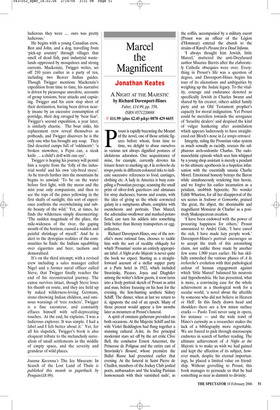Marcel the Magnificent
Jonathan Keates
A NIGHT AT THE MAJESTIC by Richard Davenport-Hines Faber, £14.99, pp. 358, ISBN 0571220088 ✆ £11.99 (plus £2.45 p&p) 0870 429 6655 Proust is rapidly becoming the Mozart of the novel, one of those artistic figures before whom, from time to time, we delight to abase ourselves in various not always dignified postures of idolatrous adoration. One acquaintance of mine, for example, currently devotes his leisure hours to marking up A la recherche du temps perdu in different-coloured inks to indicate successive references to food, carriages, clothing etc. A lady in America is busy compiling a Proustian peerage, scanning the small print of silver-fork gazetteers and almanacs for stray duchesses, barons and counts, with the idea of giving us the whole coroneted galaxy in a sumptuous album, complete with escutcheons and portraits. Thus Marcel, the adrenaline-swallower and mashed-potato fiend, can turn his addicts into something little better than literary trainspotters or eggcollectors.
Richard Davenport-Hines, one of the novelist’s more rational fans, chooses to tackle him with the sort of stealthy obliquity for which ‘Proustian’ seems an entirely appropriate label. A Night at the Majestic is never quite the book we expect. Starting as a straightforward account of a stellar supper party at a Paris hotel in 1922, which included Stravinsky, Picasso, Joyce and Diaghilev among the writer’s fellow guests, it soon turns into a lively portrait sketch of Proust as artist and man, before focusing on his host for the evening, the lion-hunting aesthete Sidney Schiff. The dinner, when at last we return to it, signposts the end of an epoch. Many of those present would appear a few months later as mourners at Proust’s funeral.
A spirit of omnium gatherum prevailed on both occasions. At the Majestic Schiff and his wife Violet Beddington had flung together a stunning cultural A-list, its five principal modernist stars set off by the art critic Clive Bell, the conductor Ernest Ansermet, the Princesse de Polignac and the entire cast of Stravinsky’s Renard, whose première the Ballet Russe had presented earlier that evening. At the funeral in Saint Pierre de Chaillot, members of the Jockey Club jostled poets, ambassadors and ‘the leading Parisian homosexuals with their varnished nails’, as the coffin, accompanied by a military escort (Proust was an officer of the Légion d’Honneur) entered the church to the strains of Ravel’s Pavane for a Dead Infanta.
‘I always thought him Jewish, little Marcel,’ muttered the anti-Dreyfusard author Maurice Barrès after the elaborately Catholic obsequies were over. Everything in Proust’s life was a question of degree, and Davenport-Hines begins his tour of its alienations and ambiguities by weighing up the Judaic legacy. To the vitality, courage and endurance denoted as specifically Jewish in Charles Swann and shared by his creator, others added family piety and an Old Testament prophet’s capacity for moral indignation. Yet Proust could be merciless towards the arrogance of ‘Israelite dealers’ and despised the kind of vulgar hankering after assimilation which appears ludicrously to have straightened out Bloch’s nose in Le temps retrouvé.
Integrity, ruling the Proustian value system as much sexually as racially, rescues the sulphurous arch-sodomite Charlus. The sadomasochistic episode which sees him whipped by a young shop assistant is merely a pendant to his ultimate apotheosis in a hopeless infatuation with the essentially satanic Charlie Morel. Emotional honesty betrays the Baron while simultaneously rendering him heroic, and we forgive his earlier incarnation as a petulant, snobbish hypocrite. No wonder Edith Wharton, for all her disapproval of the sex scenes in Sodome et Gomorrhe, praised ‘the great, the abject, the abominable and magnificent Monsieur de Charlus’ as a positively Shakespearean creation.
‘I have been endowed with the power of procuring happiness for others,’ Proust announced to André Gide, ‘I have cured the sick, I have made lazy people work.’ Davenport-Hines’s portrait encourages us to accept the truth of this astonishing claim, not unlike those made by another Jew some 1,900 years earlier. He has skilfully enmeshed the various phases of A la recherche’s evolution with that pathological ardour of human engagement against which ‘little Marcel’ balanced his neurosis and hypochondria. He has presented, what is more, a convincing case for the whole achievement as a theological work for a secular world, ‘a novel about the afterlife by someone who did not believe in Heaven or Hell’. In this finely drawn head and shoulders there are a few minor surface cracks — Paolo Tosti never sang in opera, for instance — and the wide trawl of Hines’s curiosity as a researcher makes the lack of a bibliography more regrettable. We are forced to pick through microscopic endnotes in search of further reading. The ultimate achievement of A Night at the Majestic is to make us wish we had gained and kept the affection of its subject, however much, despite his eternal importunings, he placed a limited value on friendship. Without grovelling to Proust, this book manages to persuade us that he had something as near as dammit to divinity.


















































































 Previous page
Previous page